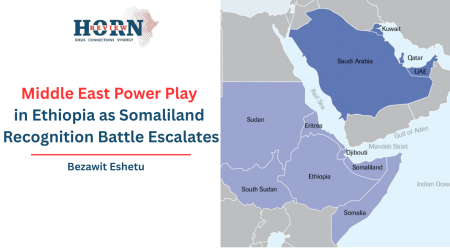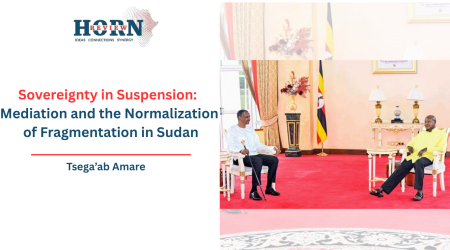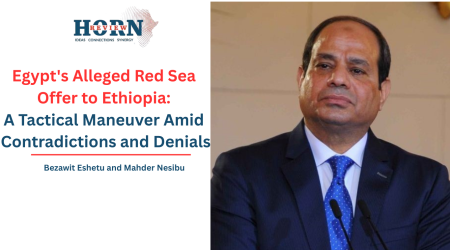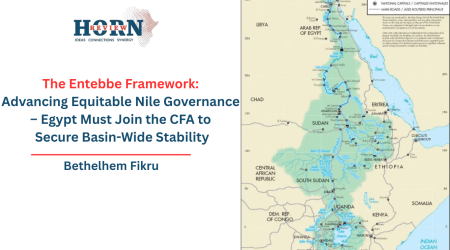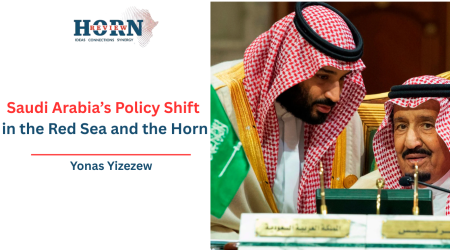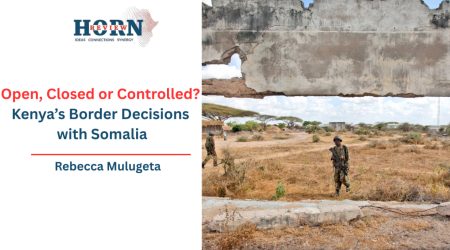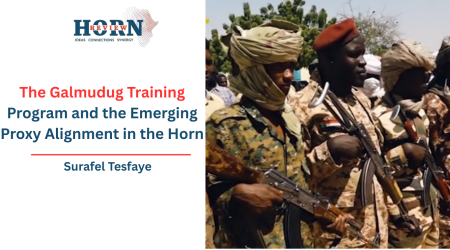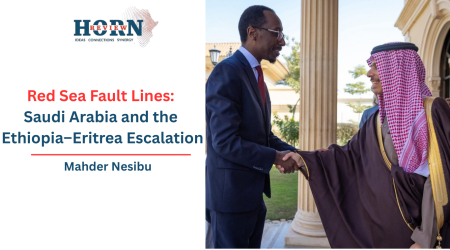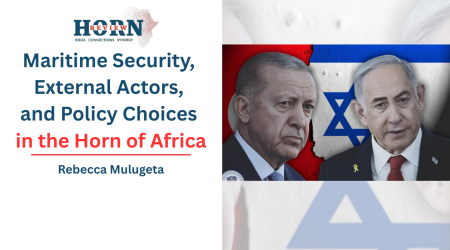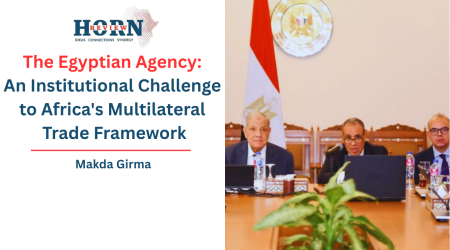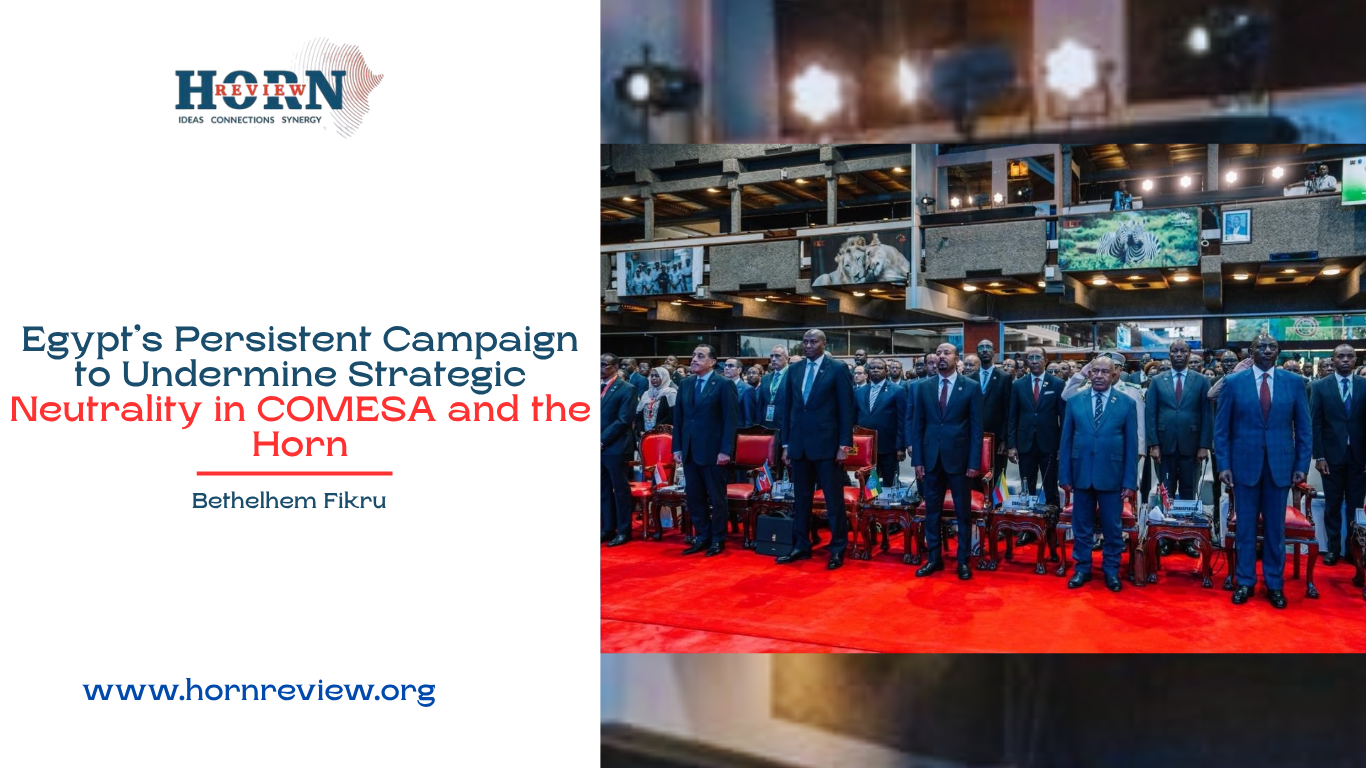
18
Oct
Egypt’s Persistent Campaign to Undermine Strategic Neutrality in COMESA and the Horn
The 24th COMESA Summit held in Nairobi with the theme “Leveraging Digitalization to Deepen Value Chains for Sustainable and Inclusive Growth” was organized in a framework of a platform whose objective was to enhance economic integration, regional trade, and common development among 21 member states. But in addition to its technical agenda of digitalization, agriculture, and industrial cooperation, the summit revealed an emerging geopolitics undertone .Egypt’s subtle but persistent effort to redesign the political arithmetic of the Horn of Africa by challenging the region’s long-standing habit of neutrality.
Egypt’s heightened diplomacy throughout and in the lead-up to the summit demonstrated its determination to influence regional states, particularly Kenya, via bilateral engagement and rhetorical persuasion framed in the parlance of partnership. Cairo’s primary aim was to redirect regional balances to its benefit after a series of diplomatic setbacks over the past few years. The objective of these actions has now shifted from formal negotiations around transboundary resources to the broader domain of political alignments and institutional diplomacy. On the instrument of COMESA as an engine of regional power projection, Egypt wants to turn an economic community into a geopolitical platform, politely turning the organization’s cooperative agenda into advocacy for its national agenda.
Kenya, as the host country and one of the emerging regional powers, was one such focus area. Egypt’s dissatisfaction with Nairobi’s independent posture, particularly President William Ruto’s engagement with Ethiopia GERD inauguration and energy projects, exposed Cairo’s discomfort with neutral diplomacy. Rather than recognizing neutrality as a stabilizing factor, Egypt increasingly interprets it as a challenge to its influence. Its reaction to Kenya’s foreign policy of equilibrium, or in terms of open dialogue with all the neighbors, betrays a shift towards the coercion of Nairobi towards harmonization under the cover of economic cooperation and mutual development.
Egyptian members of the Nairobi summit delegation intended to maintain regional cooperation within the parameters of “good neighborliness” and “mutual benefit,” besides proposing the formulation of joint positions on transboundary and security matters. Behind these diplomatic phrases was a strategic attempt to deploy the COMESA development agenda as an instrument of re-orientation. Backdoor politicization risks a misdirection of the bloc’s priorities away from its original economic and trade mission into the pursuit of specific political agendas, if unchecked. This act risks deflecting COMESA’s neutrality and inclusivity reputation as a regional organization, if allowed to its trajectory.
Kenya’s response has been diplomatically prudent. In maintaining its policy of even regional balance and seeking diplomacy with Egypt, Nairobi reaffirmed its doctrine of strategic neutrality, a policy under which it permits contact with all but not due to exterior pressure. The policy is essential to the stability of the Horn and a model for regional diplomacy. Kenya’s hesitation to politicize COMESA reflects its understanding that economic stability and integration rest upon maintaining the capability to remain neutral and cooperative.
Egypt’s effort to redefine the game of neutrality, however, is more than with regard to COMESA. Cairo, in recent years, has initiated a string of bilateral engagements with countries such as Somalia, Eritrea, and Sudan, typically supplementing aid, defense cooperation, and political support in conventional combinations. These gestures, while purportedly mutually satisfactory bargains, in most cases are intended to align regional opinion with Egyptian strategic interests.
The pattern is evident: Cairo uses economic incentives and security coordination to guide traditionally independent foreign-policy actors. These moves discredit the ability of the region to act independently and possibly reinforce division at the cost of overall progress.
In the eyes of Ethiopia, such actions threaten its own national interests as well as the broader vision for African-initiated cooperation. COMESA to Ethiopia is not a political arena of conflict but a platform for regional development on the principles of equitable trade, connectivity, and industrialization. Cairo’s attempt to hijack the agenda of the organization or compromise neutrality in member states violates such principles and destroys the trust that is the source of regional cooperation.
The comparative strength of COMESA is the ability to unite states with varying interests under a flag of economic complementarity. Politicizing such an arrangement by introducing political agendas into it is to disunite it and destabilize its ability to realize tangible development outcomes. Egypt’s attempt to realign COMESA priorities away from integration and trade and towards geopolitical alignment thus poses a strong challenge to the region’s vision towards collective growth.
Ethiopia is founded on the maintenance of regional balance and the development of consensus and equality based institutions. Any external pressure that forces states to line up against one another undermines such a platform and diminishes the cooperative environment upon which African integration processes are constructed. Ethiopian neutrality is not indifference, it is a deliberate decision that keeps communication alive, de-polarizes, and enhances institutional resilience.
The Nairobi summit finally revealed two rival visions for the future of COMESA. One is based in regional value chains, economic cooperation, and joint development. The other is constructed through malevolent diplomatic gamesmanship and efforts to recycle economic models as political leverage tools. Egypt’s effort to reverse regional alignments can create temporary alliances, but at the cost of integration and trust in the long term. Its bid to draw non-aligned nations into special relationships risks alienating the critical ones such as Ethiopia and Kenya whose alliance is central to regional stability.
In the coming years, COMESA’s image will depend on its ability to shield its agenda from political interference and reaffirm its original principle of inclusivity. Member states must be extremely cautious against efforts to convert cooperative platforms into instruments of power. To Ethiopia, this also means safeguarding national interests by guarding regional institutions against external interference and remaining impartial as a viable and respected policy choice.
Egypt’s unrelenting pursuit to tilt the balance of neutrality within the COMESA and Horn of Africa region is not only a threat to Ethiopia’s national interest but to regional stability based on balance, sovereignty, and dialogue. Whereas Cairo may still attempt to seek new alignment, greater consciousness among member states of the need for strategic neutrality, such as that of Kenya and increasingly by Ethiopia, will leave coercive diplomacy with less space in the evolving politics of the region. The future of COMESA and the Horn is not a coalition against the interests of one state but in collaborative determination to each other’s rewarding cooperation and to Africa’s self-determination in forging its own path towards development and stability.
By Bethelhem Fikru, Researcher, Horn Review

